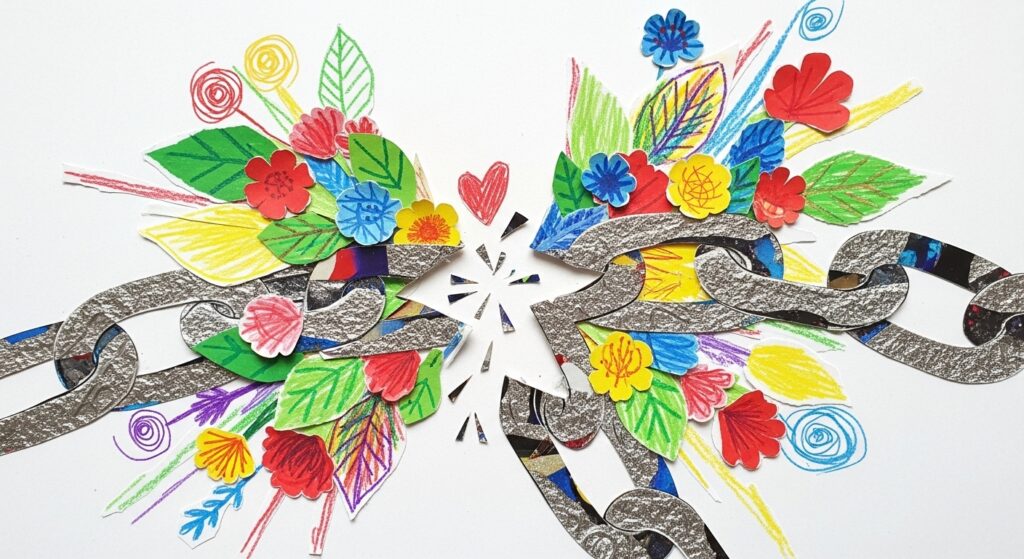Steps to Release Breakup Resentment and Truly Move Forward
Release Breakup Resentment: Introduction
Holding onto resentment after a breakup can feel like being stuck, constantly replaying the past and losing control over your own emotional peace. This persistent anger or bitterness doesn’t punish your ex; it keeps you from healing and growing. It’s time to take back your power. This article provides clear, actionable steps to help you release breakup resentment, allowing you to move forward with a lighter heart and open yourself to a more fulfilling future.

Recognizing Resentment’s Grip to Start Your Path to Release Breakup Resentment
It’s a subtle, corrosive force, often disguised as righteous anger or lingering hurt. After a breakup, resentment can take root, wrapping around your heart and mind, slowly tightening its grip. You might find yourself replaying old arguments, fixating on perceived injustices, or feeling a bitter taste whenever your ex’s name comes up. This isn’t just about sadness or grief; it’s a persistent, simmering anger that keeps you tethered to the past, preventing any real sense of peace or forward movement.The tricky part about resentment is its deceptive comfort. It can feel like a protective shield, a way to guard yourself from future pain or to justify your current emotional state. Yet, beneath that illusion of protection lies stagnation. When you’re held captive by resentment, you aren’t truly free to make choices that serve your highest good. Your energy is drained, your perspective narrowed, and your capacity for joy and new connections is significantly diminished. This isn’t the future you deserve, nor is it the way to reclaim control over your own narrative.Acknowledging that you’re holding onto this heavy burden is not a sign of weakness; it’s an incredible act of courage and self-awareness. It’s the moment you decide to stop letting the past dictate your present. This first step, the honest recognition of resentment’s presence, is the true turning point. It’s where you begin to loosen its hold, paving the way for profound personal growth and an escape from the emotional loop. You are choosing to validate your pain, yes, but more importantly, you are choosing your own freedom and the chance to build a life unburdened by past hurts. This is your opportunity to step into a new version of yourself, one that is open to genuine connection and equipped to embrace the future without the shadow of bitterness. To release breakup resentment means reclaiming your emotional landscape.
Key Points
- Resentment after a breakup is a persistent, simmering anger that keeps you tied to the past, distinct from sadness or grief.
- It often masquerades as a protective shield but actually drains energy and limits your capacity for joy and new connections.
- Acknowledging resentment is a courageous act of self-awareness, signaling a decision to prevent the past from controlling your present.
- This initial recognition is the crucial step toward loosening its grip, fostering personal growth, and achieving emotional freedom.
Practical Insights
- Take time to quietly reflect on your persistent feelings about your breakup. If you notice a simmering anger or repeated negative thoughts, acknowledge them without judgment. This validates your feelings and is the first step towards reclaiming control.
- Consider how holding onto past resentments might be blocking new opportunities or genuine happiness. This awareness helps you prioritize your own growth and emotional freedom.
- Actively name the feeling of resentment when it arises. Simply saying “I am feeling resentment” can help create a slight distance, giving you a sense of control over the emotion rather than letting it control you.

Allowing Feelings to Flow: A Key Step to Release Breakup Resentment
When a breakup leaves you grappling with resentment, the natural instinct can be to push those uncomfortable feelings down. We might tell ourselves to “just get over it,” or try to distract ourselves with a flurry of activity, hoping that if we ignore the anger, the sadness, or the bitter thoughts, they will simply disappear. However, this approach often has the opposite effect. Suppressing emotions doesn’t make them vanish; it simply buries them alive, allowing them to fester and grow, strengthening their hold on you. To truly release breakup resentment, you must first create space for your feelings to flow.
Think of your emotions as waves in an ocean. If you try to hold back a wave, you’ll be knocked over. But if you allow it to wash over you, acknowledging its presence without being swept away, it eventually recedes. The goal isn’t to wallow, but to process. This means giving yourself permission to feel everything that comes up – the anger at perceived injustices, the sadness for what was lost, the frustration, even the moments of regret. By acknowledging these emotions, you validate your experience and give yourself the opportunity to understand what’s truly bothering you. This act of self-connection is a powerful step towards regaining a sense of personal control over your emotional landscape.
Allowing feelings to flow is not a sign of weakness; it’s a courageous act of self-care and a vital part of personal growth. It’s how you move through the pain instead of getting stuck in it. When you actively engage with your emotions, you start to dissipate their intensity. This process helps you understand their source and lessens their power over your daily life. Instead of being dictated by an underlying current of bitterness, you start to steer your own emotional course, creating a clear path forward and helping you genuinely move beyond bitterness and release breakup resentment for good.
Key Points
- Suppressing emotions after a breakup intensifies resentment rather than eliminating it.
- Allowing feelings to flow means acknowledging and processing emotions, not just wallowing in them.
- Validating your feelings is a critical step for self-connection and reclaiming personal control.
- Processing emotions actively helps lessen their intensity and reduces their power over your life.
- Embracing emotional flow is essential for moving past resentment and fostering personal growth.
Practical Insights
- Dedicate specific time each day to sit with your feelings without judgment; consider journaling or meditation to acknowledge their presence.
- Share your feelings with a trusted friend, family member, or therapist to gain external validation and process them openly.
- Practice self-compassion by recognizing that feeling difficult emotions is a natural and necessary part of healing and moving forward.

Changing Your Story to Effectively Release Breakup Resentment
It’s natural to replay a breakup story in your mind, focusing on the pain, the betrayals, or the unfairness of it all. This internal narrative, often filled with “what ifs” and “they should haves,” can feel like a heavy chain, binding you to anger and bitterness. When you’re trying to release breakup resentment, one of the most powerful things you can do is to rewrite that story. It’s not about denying what happened or pretending it didn’t hurt. It’s about taking back your power and deciding how this chapter will ultimately shape you. Many of us get stuck in a narrative where we are the victim, or where our ex is the villain. While there might be elements of truth in both, holding onto these rigid roles keeps resentment alive. This way of thinking gives your past relationship an undue amount of control over your present emotions and future possibilities. By consciously choosing to alter your perspective, you begin to reclaim agency over your emotional well-being. This shift allows for immense personal growth. You start to see yourself not as someone who was merely hurt, but as a resilient individual who moved through a difficult experience and emerged stronger. Consider your breakup not just as an ending, but as a catalyst. Perhaps it opened your eyes to unhealthy patterns you didn’t see before, or highlighted aspects of yourself you wanted to improve. Maybe it freed you from a situation that was holding you back, even if you couldn’t see it at the time. This isn’t about sugarcoating; it’s about finding the lessons and the opportunities for self-improvement that were hidden within the pain. When you adjust the lens through which you view your past, you can finally let go of the emotional baggage that has weighed you down. Creating a new narrative means asking different questions. Instead of “Why did this happen to me?” try “What did I learn from this experience?” or “How can I use this to build a better future for myself?” This isn’t just an intellectual exercise; it’s a profound act of self-care. It allows you to validate your own feelings while also giving yourself permission to move forward. You detach your identity from the hurt and begin to connect with a future version of yourself who is whole, self-aware, and ready for healthier connections. This revised story becomes a testament to your ability to overcome, giving you a greater sense of control and belonging in your own life. When you change your story, you aren’t changing the past, but you are absolutely changing your present and shaping your future.
Key Points
- Holding onto a rigid, victim-focused breakup narrative fuels resentment and limits personal progress.
- Actively rewriting your breakup story involves shifting your perspective from pain to lessons learned and opportunities for growth.
- This narrative change isn’t about denying past hurt but about reclaiming control over your emotional state and future outlook.
- Reframing the breakup as a catalyst for self-improvement allows you to release emotional baggage and build a stronger identity.
- By asking forward-looking questions, you validate your experience and align with a more resilient future self.
Practical Insights
- Identify Your Current Story: Write down your breakup narrative. Notice where you assign blame or cast yourself as a victim. This helps you identify points where you can reclaim control over your perspective.
- Reframe with Growth in Mind: For each painful aspect of your old story, ask yourself: “What did I learn from this?” or “How has this made me stronger or clearer about my needs?” This fosters personal growth and self-awareness.
- Focus on Future Possibilities: Instead of dwelling on what was lost, think about what new opportunities or freedoms this ending created. This shifts your focus to a more hopeful future, connecting you with possibilities for new connections and a deeper sense of self-belonging.

Finding Forgiveness as a Way to Release Breakup Resentment
When a relationship ends, especially painfully, holding onto resentment can feel like a protective shield. It’s a natural response to hurt, a way to keep emotional distance from the person who caused you pain. But here’s the quiet truth: while it feels like you’re punishing them, resentment’s heaviest weight is borne by you. It’s a constant, draining replay of the past, keeping your heart tethered to what was, preventing you from truly moving forward and finding peace. The powerful act of forgiveness isn’t about excusing someone’s behavior or pretending the hurt didn’t happen. It’s not about reconciling, nor does it mean you have to forget the lessons learned. Instead, forgiveness is a profound gift you give to yourself. It’s the conscious decision to release the tight grip of anger, bitterness, and the desire for retribution that binds you to the past. By choosing to forgive, you reclaim control over your emotional well-being. You decide that your peace matters more than holding onto a narrative of pain. This act of releasing the past allows for significant personal growth, enabling you to rise above the hurt and find a deeper connection with your authentic self. It offers an escape from the mental prison of constant rumination and frees up vital energy that can be directed toward building a fulfilling present and future. Consider that choosing to forgive is an act of profound self-love, freeing you from a cycle of pain and allowing you to truly let go of bitterness. This doesn’t mean the hurt magically disappears overnight. It’s a gradual process, often requiring patience and self-compassion. It’s about acknowledging your valid feelings of betrayal or sadness, then deliberately making the choice to dismantle the emotional wall resentment has built around your heart. This choice validates your experience while also asserting your power to heal and thrive, independent of your past relationship.
Key Points
- Resentment, while feeling protective, primarily harms your own peace and emotional progress.
- Forgiveness is a personal choice to release the emotional burden of anger and bitterness, not to condone past actions.
- The act of forgiving allows you to reclaim control over your emotional state and focus on your well-being.
- It’s a gradual process of acknowledging pain and consciously deciding to free yourself from the past’s grip.
- Releasing resentment through forgiveness fosters personal growth and creates space for a more peaceful future.
Practical Insights
- Dedicate time to reflect on what specifically you’re holding onto; naming the hurts can be the first step towards consciously letting them go.
- Practice self-compassion throughout the process, understanding that forgiveness is a deeply personal and often challenging emotional release, not a quick fix.
- Focus on the future benefits: increased peace, more energy for new experiences, and building stronger, free from the shadows of past resentments.

Setting Strong Boundaries to Help Release Breakup Resentment
The echoes of a past relationship can linger, often manifesting as resentment that clings stubbornly to your heart. It’s a bitter residue, a a heavy weight that prevents you from stepping fully into your future. While letting go seems daunting, one of the most powerful steps you can take to release breakup resentment is to establish strong, clear boundaries. This isn’t about building walls around your emotions to keep others out; it’s about creating a sacred space for yourself, where healing can truly begin without interference. Think of boundaries as your personal blueprint for emotional safety. They give you a profound sense of control over your environment and interactions, especially with an ex. When you consistently enforce these limits, you prevent old wounds from being reopened and new ones from forming. Resentment often thrives when we feel taken advantage of, disrespected, or still entangled in unhealthy dynamics. Clear boundaries dismantle those pathways, allowing you to reclaim your personal power. This act of self-preservation signals to yourself, and to others, that your well-being is a priority. Setting boundaries may involve limiting contact with your ex, defining what topics are off-limits, or even unfollowing them on social media. It might mean saying “no” to requests that compromise your peace, or establishing strict rules for co-parenting or shared finances. Each boundary you put in place is a declaration of your worth and a commitment to your growth. It validates your right to peace and emotional freedom. This proactive approach helps to sever the invisible threads that might still connect you to the source of your pain, allowing the resentment to gradually loosen its grip. By creating this protective framework, you are not only shielding yourself from further hurt but also actively creating the conditions for escape from the emotional prison resentment has built. It allows you to breathe, to recenter, and to focus on what brings you joy and fulfillment. This deliberate act of self-care fosters a deeper connection with your own needs and desires, paving the way for a future unburdened by past grievances. Releasing breakup resentment isn’t about forgetting; it’s about remembering your strength and choosing to move forward with grace and renewed self-respect.
Key Points
- Strong boundaries are essential for releasing breakup resentment, creating a safe and protected space for personal healing.
- Boundaries offer a vital sense of control over your interactions and environment, preventing the re-opening of old wounds.
- Establishing limits, such as restricting contact or social media interaction, is an act of self-worth and a commitment to personal growth.
- Clear boundaries actively help to sever lingering emotional ties to past pain, which allows resentment to gradually diminish.
- This practice of self-care provides emotional escape and fosters a deeper connection with your own needs, leading to a future unburdened by past grievances.
Practical Insights
- Clearly define and communicate your non-negotiable boundaries with your ex, whether it’s “no contact” or specific rules for necessary interactions, to regain control over your emotional space.
- Practice saying “no” to requests that drain your energy or disrupt your peace; each “no” to external demands is a “yes” to your own healing and growth.
- Actively use social media blocking or unfollowing features if needed to create a clean break and facilitate an escape from constant reminders of the past, validating your need for a peaceful recovery.

Cultivating a Future as You Release Breakup Resentment
The lingering shadow of breakup resentment can feel like an unwelcome guest, stealing your joy and clouding your vision of what comes next. It’s a heavy burden, often keeping you chained to a past that no longer serves you. But here’s the vital truth: your future is waiting, vibrant and full of potential, and it demands your full attention. The act of letting go of that resentment isn’t about forgiving your ex if you’re not ready; it’s about reclaiming your emotional freedom and giving yourself permission to build a life rich with happiness.
Imagine shedding that weight. What new possibilities emerge? When you actively choose to release breakup resentment, you’re not erasing the pain; you’re simply deciding that the past will no longer dictate your present or your destiny. This choice hands back the reins of your own life, giving you a powerful sense of control over your emotional well-being. It’s an opportunity for deep personal growth, allowing you to understand your own needs and desires with newfound clarity.
Building a future free from bitterness starts with intentional action. Reinvest the energy you once spent replaying old hurts into crafting the life you truly want. Pick up old hobbies, engage in new activities, or focus on career goals. These steps help you define yourself beyond the breakup, reinforcing a strong sense of self and purpose. Seek out new social circles or strengthen existing friendships. Forming new connections helps you feel a renewed sense of belonging and reminds you that warmth and support are abundant.
Remember, releasing resentment is a gradual process, not a sudden event. There will be days when old feelings resurface, and that’s okay. Acknowledge them, but then gently redirect your focus to the future you’re actively creating. By doing this, you validate your own feelings while asserting your power to move forward. The goal is not to pretend the breakup didn’t happen, but to acknowledge its role in your story and then consciously move past its grip. Your capacity for happiness, peace, and meaningful connection is immense, and it’s time to claim it.
The journey away from resentment clears the path for genuine satisfaction. It’s about building a solid foundation for your next chapter, one where you feel secure, valued, and in charge of your own narrative. Embrace this chance to design a life where you feel connected to yourself and others, where personal growth is constant, and where your sense of belonging is unshakable.
Key Points
- Releasing breakup resentment is essential for reclaiming emotional freedom and constructing a fulfilling future.
- The process involves taking control of your present and future, prioritizing your well-being over past grievances.
- Actively engage in new hobbies, activities, and social connections to redefine your identity and cultivate a sense of belonging.
- Understand that releasing resentment is a gradual journey, requiring acknowledgment of feelings while consistently redirecting focus toward a positive, self-created future.
Practical Insights
- Reclaim Your Narrative: Instead of dwelling on past hurts, actively visualize and plan small, achievable steps for your desired future to assert control over your life and promote continuous personal growth.
- Cultivate New Connections: Dedicate time to nurture existing friendships or seek out new social groups to reinforce your sense of belonging and broaden your support network, fostering deeper connection.
- Redefine Your Self-Worth: Engage in activities that genuinely interest you and make you feel accomplished, validating your inherent value and fostering a deeper connection with your authentic self.
Conclusion
Releasing breakup resentment is a powerful act of self-care and a testament to your resilience. By actively engaging with your feelings, reframing your experiences, practicing forgiveness, and setting clear boundaries, you reclaim control over your emotional landscape. This process is not about forgetting the past, but about integrating it into a narrative of strength and personal growth, ultimately allowing you to step into a future defined by peace and new possibilities.